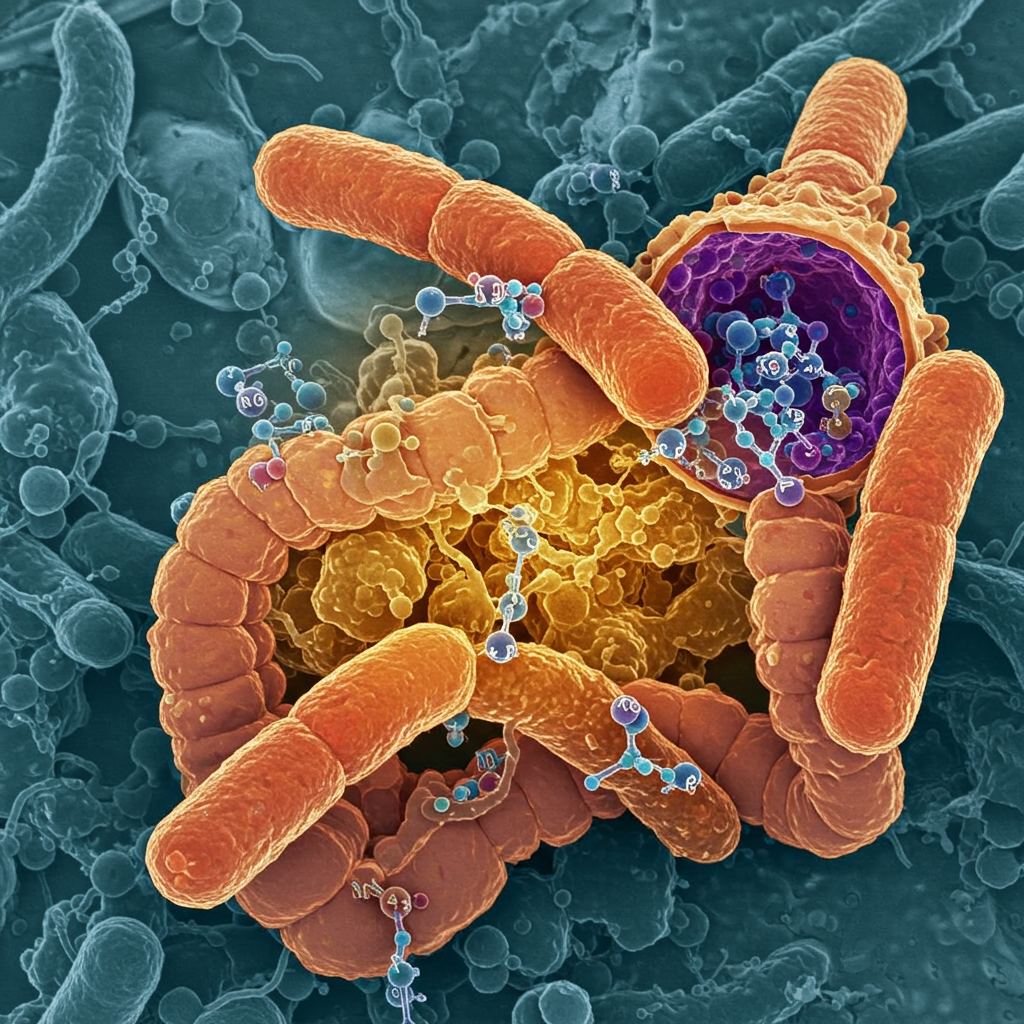Toxic “forever <a href="https://news.quantosei.com/2025/07/04/bosses-are-catching-on-to-their-overemployed-staff-one-worker-says-theyre-making-3k-a-day-doing-5-jobs/” title=”Overemployment: Secretly Working 5+ Jobs”>chemicals,” scientifically known as perfluoroalkyl and polyfluoroalkyl substances (PFAS), are everywhere. They linger in our environment and accumulate in our bodies, raising serious health concerns. For years, finding effective ways to remove these persistent compounds has been a major challenge. But exciting new research offers a potential solution hidden within us: our own gut bacteria. Scientists have discovered that certain gut microbes can absorb and sequester PFAS, pointing towards novel strategies for mitigating their harmful effects.
The Persistent Problem of Forever Chemicals
PFAS are a vast family of synthetic chemicals. Manufacturers use them widely because they resist heat, water, oil, and grease. You can find them in countless everyday products. This includes non-stick cookware, waterproof clothing, cosmetics, and food packaging. The strength of their chemical bonds makes them incredibly stable. They break down extremely slowly, taking thousands of years. This persistence is why they earned the nickname “forever chemicals.”
Their stability means they build up in soil, water, air, and wildlife. They have become embedded in global manufacturing processes. Avoiding them completely is nearly impossible in modern life. Consequently, PFAS are accumulating in human bodies worldwide. While research continues to clarify the full extent of the harm, exposure to PFAS has been linked to various health issues. These include decreased fertility, developmental delays in children, kidney damage, increased risk of certain cancers, and cardiovascular diseases.
A Surprising Discovery in the Gut
Previous studies had shown that some bacteria found in the environment can interact with PFAS. However, it wasn’t clear if bacteria naturally living inside humans possessed this ability. An international team of researchers, including scientists from the University of Cambridge, set out to investigate this question. Their findings, published in the journal Nature Microbiology, reveal a remarkable capacity within our own microbiome.
The study showed that several species of human gut bacteria can effectively absorb and store various types of PFAS. Lead researchers Dr. Kiran Patil and Dr. Indra Roux from the University of Cambridge were key members of the team. They highlighted the significance of finding this capability within our own bodies. The potential exists to boost these helpful microbes. Doing so could help protect us from the toxic effects of these chemicals.
How Gut Bacteria Tackle PFAS
The researchers conducted detailed lab tests. They screened numerous gut bacterial strains for their ability to absorb forever chemicals. Their work identified a total of 38 different human gut bacterial strains capable of soaking up PFAS. These strains worked across a range of chemical concentrations. One particular fiber-degrading bacterium stood out: Bacteroides uniformis. It proved to be among the most effective strains tested at absorbing the chemicals.
Experiments provided key insights into the absorption process. The bacteria demonstrated a “remarkably high capacity” to take up PFAS from their surroundings. They don’t just hold them externally. The bacteria absorb the chemicals and store them internally. This storage often occurs in clumps inside their cells. This clumping mechanism seems crucial. It appears to protect the bacteria themselves from the toxic effects of the chemicals. The absorbed PFAS are effectively locked away, minimizing their impact on the bacterial cells.
Evidence from Mouse Studies
To see if this absorption works in a living system, the researchers conducted experiments using mice. They implanted nine of the identified PFAS-absorbing bacterial species into the guts of mice. This effectively created a “humanized” gut microbiome in the animals. The mice were then exposed to common PFAS compounds, including PFOA and PFNA.
The results were highly encouraging. The implanted microbes quickly absorbed the PFAS ingested by the mice. Crucially, this absorption led to the chemicals being excreted from the mice’s bodies. The PFAS were removed via their feces. The study measured significant absorption rates. Bacteria absorbed between 25 percent and 74 percent of the PFNA ingested. For PFOA, the absorption rate was between 23 percent and 58 percent. This suggests the bacteria can capture a substantial amount of the chemicals. The study also observed that the microbes worked harder as the levels of forever chemicals increased. They continued to remove a consistent percentage of the toxins.
Why This Discovery Matters for Human Health
PFAS are already prevalent in the environment. They are present in our bodies. Finding ways to reduce their presence is essential to mitigate their health impact. Dr. Indra Roux emphasized this urgency. “We haven’t found a way to destroy PFAS,” she noted. However, these findings open a new possibility. They suggest developing methods to get the chemicals out of our bodies. This is critical because they do the most harm inside us.
Dr. Kiran Patil highlighted the scale of the problem. He expressed concern that little is being done to remove these chemicals from our bodies. Given the potential effects on human health, this research offers a beacon of hope. While the ability of these bacteria to remove PFAS directly from human bodies still needs full confirmation in human trials, the findings are promising.
Future Possibilities: Probiotics and Beyond
The study opens exciting avenues for intervention. Could we potentially boost these helpful bacteria in our guts? The researchers suggest that probiotic dietary supplements might be developed. These probiotics would contain specific mixes of the identified gut microbes. Introducing these bacteria could help safely clear PFAS from our systems. This microbiome-based strategy offers a novel approach to reducing the body’s burden of these persistent chemicals.
Building on this research, scientists Dr. Lindell and Dr. Patil have already co-founded a startup company called Cambiotics. This venture aims to develop probiotic solutions specifically for removing PFAS from the body. They are actively exploring ways to enhance the performance of these beneficial microbes. This innovative step demonstrates the real-world potential they see in their findings.
An external expert, Lawrence Wackett, a professor of biochemistry not involved in this specific study, offered an interesting perspective. He noted that this finding, combined with another recent study suggesting some gut enzymes might break down PFAS bonds, indicates the human gut microbiome could potentially contribute to both sequestering (absorbing/storing) and possibly degrading some fluorinated compounds. This multi-faceted role would be even more impactful.
While future solutions like targeted probiotics are developed, simple steps can still help reduce exposure. Experts suggest avoiding PFAS-coated cooking pans. Using a good water filter can also help minimize intake. Dr. Anna Lindell described PFAS as a “slow poison.” They are not acutely toxic at low levels. Their danger is less immediately apparent. Their harm comes from accumulating over time.
Frequently Asked Questions
What are “forever chemicals” and why are they a problem?
“Forever chemicals” are perfluoroalkyl and polyfluoroalkyl substances (PFAS). They are man-made chemicals used in many products because they resist heat, water, and oil. They earned their nickname because they break down extremely slowly, persisting in the environment for thousands of years. This persistence leads to their accumulation in nature and in human bodies, where they have been linked to various health problems like kidney damage and increased cancer risks.
How do certain gut bacteria help with PFAS?
New research shows that specific types of bacteria living in the human gut can absorb PFAS from their surroundings. These bacteria have a high capacity to soak up the chemicals. They then store them in clumps inside their cells. This process effectively sequesters the PFAS, potentially protecting the bacteria and opening a pathway for the chemicals to be removed from the body, primarily through feces.
Can probiotics containing these bacteria help remove PFAS from my body?
The recent study suggests that boosting levels of these specific gut bacteria could potentially help remove PFAS. Researchers are exploring the possibility of developing probiotic supplements containing these beneficial microbes. While this has shown promise in laboratory mouse studies, it has not yet been fully tested or confirmed in humans. It represents a promising avenue for future health interventions.
Conclusion
The discovery that human gut bacteria can absorb toxic forever chemicals marks a significant step. It reveals a potential natural defense mechanism within our bodies. Given the widespread presence of PFAS and the limited options for removing them, this finding offers hope. Future research and development, possibly involving targeted probiotics, could provide new tools to help our bodies mitigate the harmful effects of these persistent pollutants. Addressing the challenge of forever chemicals requires innovative approaches. This exploration into the power of our gut microbiome is a compelling path forward.




